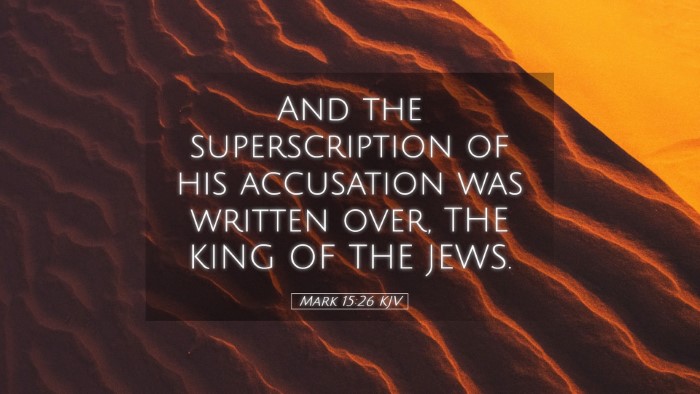Commentary on Mark 15:26
Verse: "And the inscription of his accusation was written over, The King of the Jews." (KJV)
Introduction
Mark 15:26 presents a pivotal moment in the crucifixion narrative, highlighting the charge against Jesus and framing His identity within the context of His trial and execution. This verse features prominently in the accounts of the Passion, serving as a significant theological statement regarding the nature of Christ and His kingship.
Historical Context
The phrase "The King of the Jews" represents an ironic testament to Jesus's identity. In the eyes of the Roman authorities, this was a mockery, intended to shame Him and display the might of Rome over those who claimed any form of royalty. Public domain commentaries shed light on the sociopolitical dynamics at play during this period, detailing how the Jewish leaders sought to utilize Roman power to eliminate Jesus, fearing His influence over the people.
The Inscription and Its Significance
The inscription that noted Jesus’s crime holds substantial weight in both Isaiah’s prophecy and Roman legal custom. According to Matthew Henry's Commentary, the inscription was not merely a label but a prophetic affirmation that Jesus was indeed the awaited Messiah, despite the twisted perception by His contemporaries. Henry notes, “It is a just complaint of the righteous, that their just actions often meet with evil testimonies.” Here, the inscription does both: it condemns Jesus in worldly terms while simultaneously revealing the truth of His identity to those who would see.
Theological Reflection
In understanding this verse, Albert Barnes elucidates the deeper implications of the title "King of the Jews." He argues that this statement encapsulates the core conflict of Jesus’s mission: the establishment of a heavenly kingdom versus earthly power. Jesus’s kingship is not rooted in political struggle but in spiritual redemption. This perspective challenges modern believers to reconsider the nature of authority and significance in their own lives.
Irony in the Kingship
According to the commentary by Adam Clarke, the irony of this title is profound. Rather than diminishing Jesus, the title emphasizes His calling and mission. Clarke writes, “This title was affixed by the Roman powers to show their contempt; in reality, it declared the truth that He was and is the King.” This profound irony serves as a reminder of God’s sovereignty transcending human actions and intentions.
Relation to Prophecy
This moment must also be viewed through the lens of Old Testament prophecy. The prophets foretold a Messiah who would suffer and die, yet reign eternally. The inscription of His accusation fulfills the prophecy and reinforces the belief in Jesus as the fulfillment of the law and the prophets. This connection is significant for theological discourse, as it validates the New Testament's claims regarding Jesus's identity.
Implications for Believers
The insights gained from Mark 15:26 challenge modern Christians. The significance of Jesus’s kingship encourages them to reflect on their own allegiance to His reign in their lives. Just as the Roman authorities intended to mock the title, believers are called to embrace it, living under the lordship of Christ in a world that often ridicules or undermines such claims. The truth of this verse also emphasizes the paradox of Christian faith — victory through apparent defeat.
Conclusion
Mark 15:26 serves as a reminder of the complex nature of Jesus's identity as the King of the Jews. The charge against Him, filled with irony and theological significance, invites deeper reflection on the meaning of kingship, authority, and suffering. As interpreted by theologians across centuries, this verse calls believers to reaffirm their faith in Christ’s kingdom, recognizing that it often subverts worldly expectations and powers.


